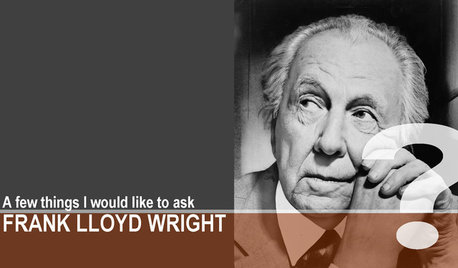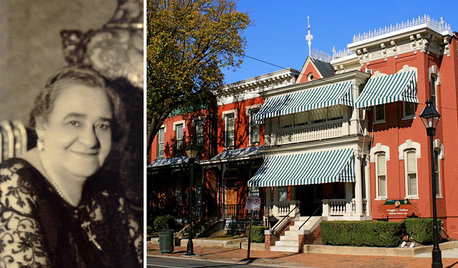A Juneteenth/Civil War era question I have
Elmer J Fudd
last year
Related Stories

COFFEE WITH AN ARCHITECTA Few Things I Would Like to Ask Frank Lloyd Wright
It could take a lifetime to understand Frank Lloyd Wright's work — less if we had answers to a few simple questions
Full Story
CRAFTSMAN DESIGNKitchen of the Week: Kitchen Returns to the Craftsman Era
Minnesota designers incorporate fine woodwork, Arts and Crafts stenciling, and handmade lights and tiles into their new space
Full Story
HISTORIC HOMESInside the Home of a Civil Rights Trailblazer
Business leader Maggie L. Walker championed national change from an inspiring home base in Virginia
Full Story
ORGANIZING4 Questions to Help You Organize Your Favorite Photos
Organize your keeper photos with a system that's just right for you, whether it's in the cloud or you can hold it in your hand
Full Story
DECLUTTERINGCan’t Figure Out What ‘Sparks Joy’? Try This Question Instead
If you can’t decide whether to keep something or let it go, shift your perspective to find the answer
Full Story
REMODELING GUIDESConsidering a Fixer-Upper? 15 Questions to Ask First
Learn about the hidden costs and treasures of older homes to avoid budget surprises and accidentally tossing valuable features
Full Story
FEEL-GOOD HOMEThe Question That Can Make You Love Your Home More
Change your relationship with your house for the better by focusing on the answer to something designers often ask
Full Story
DECLUTTERING5 Questions to Overcome a Decluttering Roadblock
A professional organizer shares questions that can help you decide what to do with those items in your ‘maybe keep’ pile
Full Story
HISTORIC HOMESA New Era for African American Trailblazer Madam Walker’s Villa
Plans are underway to turn the first U.S. self-made female millionaire’s mansion into a think tank for women of color
Full Story
THE POLITE HOUSEThe Polite House: What Can I Do About My Neighbors’ Trash Cans?
If you’re tired of staring at unsightly garbage way before pickup day, it’s time to have some tough conversations
Full Story


Zalco/bring back Sophie!
whistle_b
Related Discussions
Pre Civil War circa 1840 rose
Q
English Civil War
Q
Civil War Markers
Q
Civil War novels
Q
beesneeds
cyn427 (z. 7, N. VA)
Bookwoman
Lars
kevin9408
Annie Deighnaugh
Elmer J FuddOriginal Author
patriciae_gw
bry911
Elmer J FuddOriginal Author
patriciae_gw
Elmer J FuddOriginal Author
patriciae_gw
Elmer J FuddOriginal Author
patriciae_gw
arcy_gw
Annie Deighnaugh
Elmer J FuddOriginal Author
chisue
Elmer J FuddOriginal Author
Elmer J FuddOriginal Author
colleenoz
patriciae_gw
Elmer J FuddOriginal Author
colleenoz
patriciae_gw
Elmer J FuddOriginal Author
LoneJack Zn 6a, KC
Elmer J FuddOriginal Author
patriciae_gw
arcy_gw
patriciae_gw